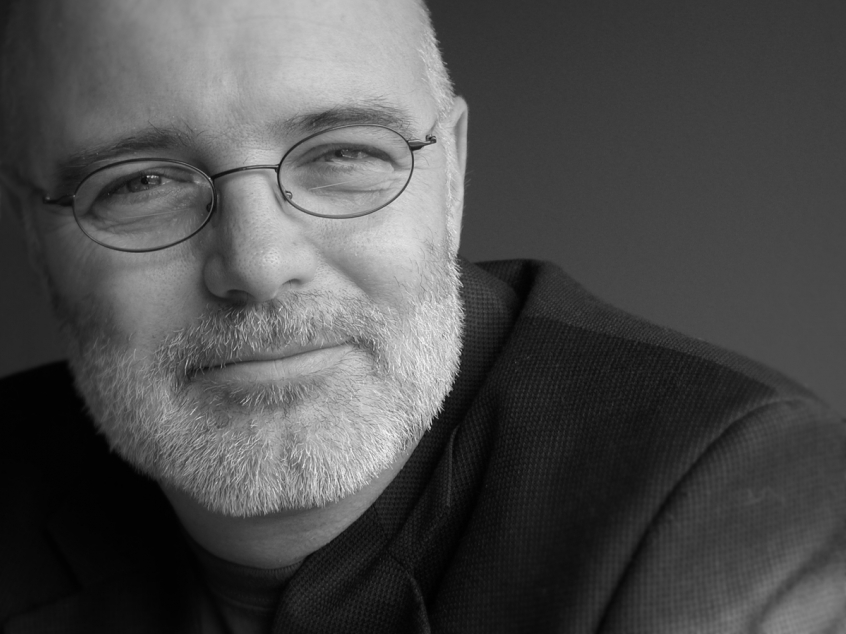It's time to stop thinking about Christianity as a system of belief focused on an exclusive Supreme Being who favours some and rejects others, protected by an all-controlling institution.
Instead, we need to move to thinking of Christianity as a way of life, from the exclusive Supreme Being to the loving and reconciling Spirit embodied in Jesus, and from a controlling, institutionalised religion to a movement for changing the whole world.

That's the thesis of a new book by theologian Brian McLaren. The Great Spiritual Migration (Hodder, £13.99) argues that it's time to rethink how we are Christians, moving away from concepts based on violence, dominance and exclusion to a vision of God based on love.
McClaren is a controversial figure. Named as one of TIME magazine's 25 most influential evangelical Christians, he's been disowned by large numbers of conservatives because of the way he's pushed the evangelical envelope. It's fair to say he's reacted against the narrow biblicism and right-wing agenda of some kinds of evangelicalism. He wants to see a different kind of Church, one that's truer to Jesus and truer to the world in which we really live. He critiques the 'conceptual beliefs' that tend to define Christian faith – the statements or propositions that we have to believe in order to be Christians. McClaren wants to replace these statements "that" something is true with relational beliefs – beliefs "in". "To say 'I believe' is to to say, 'I am committed, I am loyal, I am bound by affection and dedication' to the object of my belief," he says.
In an appendix to his book he speaks of the four 'legs' of an alternative to conceptual beliefs – a story, the unfolding narrative how God is at work in the world; saints, the inspiring examples of saints from the past and in the present; practice, the rituals and liturgies that bind us together; and a "vision of the future"– not in the Left Behind sense, but imagining the sort of world we want to see and strive for. So, he says: "Traditional Christianity has focused on a clear list of prescribed conceptual beliefs, while its story, saints, practice and vision of the future have been present, but secondary and far less clear. I propose that it is now time to reverse that emphasis, and come together around a sturdy table upheld by four legs, with bread and wine in the centre, speaking to us of Jesus."
McLaren visited the UK for a speaking tour which included an event at London's Oasis Church organised by the Progressive Christianity Network. Christian Today spoke to him at his publisher's office.
Is there really a fundamental problem with the way we do Christianity today? In Europe, Christianity is struggling across the board. The UK view of American evangelical Christianity is that it's flourishing, if a little alarming at times. But McLaren painted a different picture. In the States, people have been lamenting the decline of mainline Protestantism for 50 years, he says. Roman Catholicism has appeared to hold up better, but when you subtract the immigrant population its decline is "shocking". And there's a similar picture among evangelicals: once the immigrant factor is subtracted, there's huge cause for concern.
More than numbers
And it isn't just numbers. McLaren talks about some of the flaws in the Church even where it seems to be growing fastest, in Africa, Latin America and Asia. He recalls an encounter with a young journalist in Uganda who during the interview turned off her tape recorder and asked him, "Do you really have any hope for the Church?" "I said, I really do, but why do you ask?" McLaren says. "I've lost all hope," was the reply. "She told me story after story about prosperity gospel preachers who were literally taking widows' homes away from them, who were plundering poor people for their own enrichment, and she said, 'I now consider Christianity in Uganda a form of organised crime.'"
He tells of another encounter, with the wife of a Pentecostal pastor in Costa Rica whose children had all left the faith and who told him: "I don't think there will be a second generation of the prosperity gospel."
But the problem isn't just with declining numbers or with these egregious abuses of theology and Christian practice. McLaren is calling into question the whole way we talk about God. He wants us to look into the deep structures of our thinking, and be prepared to challenge them.
One element in Christian thinking he identifies is its desire to dominate and build an empire – a tendency he locates in the 'Doctrine of Discovery' put forward by Pope Nicholas V in 1455, some 40 years before Columbus landed in America. It commanded the Christian kings of Europe to "invade, search out, capture, vanquish, and subdue all Saracens [Muslims] and pagans whatsoever, and other enemies of Christ wheresoever placed..." McLaren describes this as the "genocide card that was given to every white Christian nation", and backs it up with some shocking details about exactly how the conquering Christian Spaniards treated the indigenous peoples they subdued.
And the doctrine of 'white Christian privilege', he believes, has become a fundamental problem in how we think of our faith. He can even provide an example from family history: his own grandfather, a Scottish missionary to Angola, responded to the assassination of Martin Luther King in 1968 with the words: "I'm glad they got that communist devil." And reflecting on the rise of Donald Trump, he says of his grandparents: "I remember the kind of things they said, would have been absolutely typical of that British jingoism [of the time]. In the UK, you have the luxury of thinking that's in your past, but in the US we're playing out what could be our future."
The great migration
It's this kind of thing that makes him decline to sing songs like Onward, Christian soldiers, and others with a militaristic bent. But he wants a much more thorough revision – a migration away from – traditional ways of talking about God. How exactly should we talk about his supremacy? How should we read the Bible? What is mission, and how should Church be part of it?
McLaren is adamant that he doesn't want to throw out traditional beliefs. Rather, he's saying we should hold them in a different way. And his purpose is, at its heart, evangelistic.
He tells Christian Today: "Among younger people I meet around the world, it's not just that they want to throw out this or that doctrine, it's that they're struggling to hold traditional doctrines in a different way."
He refers to recent research on faith in the US that revealed 39 per cent of 18-29-year-olds don't claim any religious identity. "That's a really striking change. And the highest reason is, 60 per cent of them said they don't believe the beliefs. So I really think this is not just because they're lazy or not intellectual. It's the difference between science as a method of inquiry and science as a list of facts."
And, McLaren says: "One of the ironies of the modern world is that if you say to anyone, I'm bringing you a message based on an authoritative and infallible text, I just think that leads to a position of scepticism."
So, he continues: "The most significant thing I'm saying in the book is that if being a Christian is following in the way of life Jesus taught – if that is primary, then beliefs necessarily become secondary. And we hold them differently when they're secondary than when they're primary."
Traditional language
McLaren is well aware that the kind of suggestions he's making – that Christianity needs to lose some of its traditional language and that we need to re-orient ourselves not around conceptual ideas, the traditional formulations of doctrine and dogma, but around stories, saints, practice and vision – are radical. "I'm aware that the kind of proposals I and others are making deserve far more scrutiny than whether we speak in tongues or not or whether we raise our hands or not or whether we use organs or guitars," he says.
"I wish I were not having to make deeper proposals, but I've come to believe the problems we face are not cosmetic. This is an attempt to imagine what could replace a system of beliefs as a convening gravitational force."
For some, holding so apparently lightly to these conceptual beliefs – though he stresses he has not abandoned doctrine – is always going to be problematic, and dangerous for faith. McLaren admits that it's a difficult area: "For some, it leads to a radical scepticism of every proposal to describe God," he says. But there's another approach that he describes as "radical humility". "That's where the practice of theology as an intellectual pursuit has to be integrated with the practice of theology as a contemplative pursuit. For us it's normal to distinguish those two and in some ways to make sure they don't happen in the same room at the same time. As we go forwards, they have to happen in the same room at the same time; one without the other is scary."
McLaren's preoccupation is with finding a way to talk about God in today's world, to today's people. And it's not just about reaching those outside the Church: he says he's had conversations with Christians – including megachurch pastors – who've confided in him that they aren't sure whether they're atheists now. The words they use to talk about God don't seem to match what they sense is reality.
He reflects on the average person's knowledge of the world today – that it's nearly 14 billion years old, infinitely rich and varied. "What does it mean to believe in the creator of that kind of universe? It's amazing that the word 'God' is flexible enough to contain that," he says. And yet: "For me, I go back and look at Scripture, and I think it supports that. And I look at Jesus, and I think he is the door to that growth and flexibilty."
The title of his book is The Great Migration. He writes in the introduction of how people are moving away from traditional religions, describing "this epic project, this transforming quest, this great spiritual migration towards a better way of being Christian and a better way of being human". There'll be many, especially among traditional conservative evangelicals, for whom his views are anathema, a fatal compromise with the spirit of the age. There'll be others who judge that he speaks their language, and helps them speak about God again.













